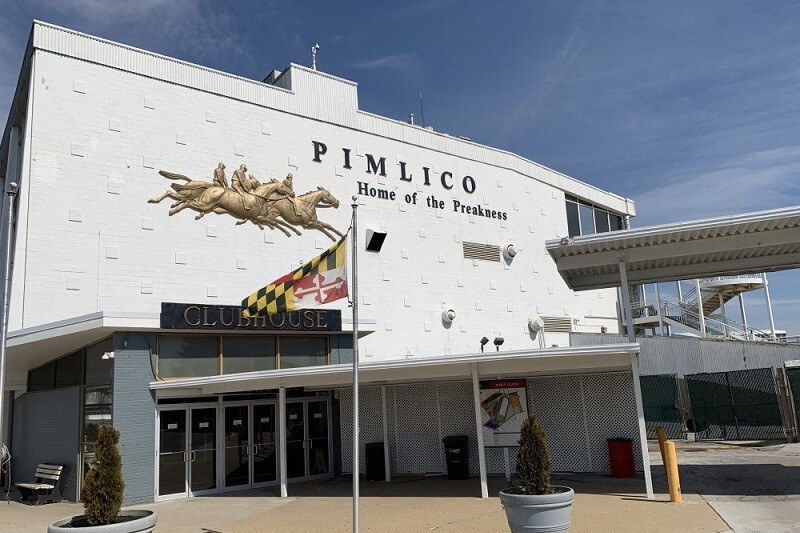Lawmakers weigh benefits, costs of Pimlico proposal

A plan to revitalize Pimlico Racetrack and the surrounding neighborhood could stumble out of the gate as lawmakers question the long-term costs.
This is the fourth time in five years that the legislature has attempted to shore up the horse racing industry and the deteriorating Pimlico track.
As in 2020 and 2022, the legislation will occupy the final weeks of the legislative session. They have three weeks to agree and send the bill to the desk of Gov. Wes Moore (D) before April 8 at midnight.
Greg Cross, an attorney and chair of the Maryland Thoroughbred Racetrack Operating Authority, told the House Ways and Means Committee Tuesday that previous efforts all failed because of a reliance on a private company to improve racing facilities in the state.
“There’s not enough profit to justify the investment in the facilities to get the return,” Cross said. “We as a state benefit exponentially from the investment.”
Cross estimated that the state receives $2 billion in direct economic benefits annually from the industry plus another $1 billion in indirect economic benefits. On top of that, it supports the horse industry, farms, and open space in the state.
“A private operator doesn’t have that motivation,” Cross said.
House Bill 1524 would codify a framework agreement worked out between a nonprofit state racing authority and the Stronach Group, the Canadian business that owns the flat racing tracks Pimlico and Laurel Park, and rights to important races.
The bill is sponsored by Ways and Means Chair Vanessa E. Atterbeary (D-Howard).
If it’s approved by the legislature and signed into law by Moore, the state would buy the historic venue for $1 from the Stronach Group, which does business as 1/ST and operates in the state under the Maryland Jockey Club name.
The nonprofit would assume the jockey club name and lease the rights to the Preakness and Black-Eyed Susan races. The rolling 10-year agreement would pay Stronach $3 million annually plus 2% of the handle from the two races each year.
The bill also includes $10 million for workforce housing for workers at the track and the community.
If approved, Cross said the new nonprofit overseeing the track and Preakness would use $400 million in bonds to rebuild the facility and build a new, state-of-the-art training facility.
Cross said the authority “does not seek to take any money away from Ocean Downs. Nor does it call for any money to be spent from this year’s budget nor for additional state money to be spent to subsidize horseracing on a going forward basis. No Money.”
Cross said bonds would be repaid through two funds dedicated to improvements of racetracks and neighboring communities. It would be supplemented with increased contributions from slot machine revenues collected by the Maryland Lottery and Gaming Control Agency. In addition, the nonprofit would also get racing money earmarked for Rosecroft, which also is owned by Stronach, and from a fund for projects at Rosecroft and Ocean Downs, which are harness racing tracks for standardbreds.
Cross said Ocean Downs would still get $1 million more annually than it would get under the current distribution formula.
But the plan is raising concerns about ongoing costs.
Legislative analysts warn that contributions from a state lottery account funded from a portion of slot revenues will be insufficient to cover the debt service.
Two other accounts are set up to pay the cost of racing and related community development projects.
“There’s going to be a lot more conversations needed because I think there is some apprehension within our membership,” said Senate President Bill Ferguson (D-Baltimore City). “We are committed to trying to salvage what we can to make sure that the horse industry is viable in Maryland, but it doesn’t come with a blank check.”
Some lawmakers said the benefits must be measured against the state’s costs.
“I’m just concerned about the future of horse racing if we get down the road two, three, four, five years and it turns out we’re losing money every year and it turns out it has to be additionally subsidized,” said House Minority Leader Jason C. Buckel (R-Allegany), a member of the Ways and Means Committee.
Ferguson stressed the importance of the track and the Preakness to both Baltimore and the state. Even so, a deal is far from done, he said.
Top of mind are possible “unknown costs” related to the effort.
“I would say there’s still a long road ahead,” Ferguson told reporters Tuesday.




 Creative Commons Attribution
Creative Commons Attribution